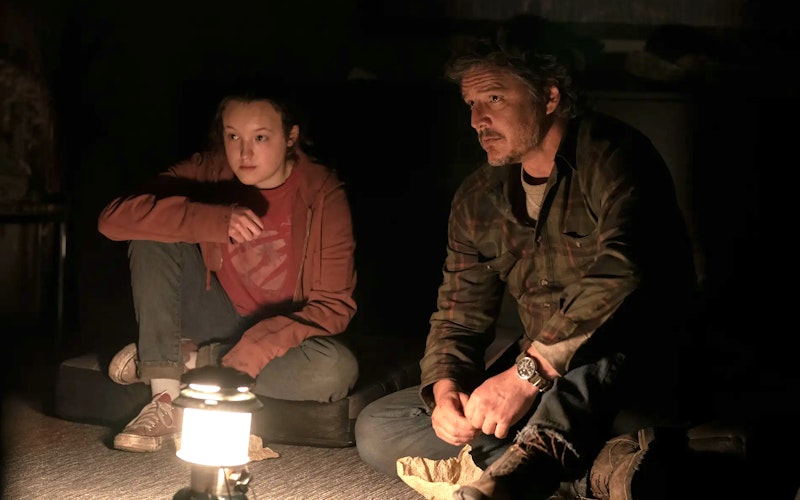
TV
The Scariest Thing About The Last of Us
The irony of The Last of Us is that the zombies are the least of the characters' fears.
In The Last of Us, which is adapted from the 2013 video-game series of the same name, civilization meets its doom through a fungal outbreak called cordyceps. (Much has already been written about cordyceps as a real-life parasitic fungus that zombifies ants and other species of insects.) Despite this terror, the real fear in the series revolves around the relationship dynamics between middle-aged survivor Joel Miller (Pedro Pascal) and teenager Ellie Williams (Bella Ramsey). After discovering that Ellie is immune to the fungal infection, Joel is tasked with transporting her from their Boston quarantine to an unknown site near the Wyoming-Colorado border. Here, research scientists are awaiting Ellie’s arrival so that a vaccine can be created to save humanity. Throughout this journey, The Last of Us presents a cinematic masterclass on our most fundamental motivator: fear.
In my seminary’s pastoral care classes, we learned that everyone operates from the same basic avoidance of two primary fears: the fear of failure and the fear of being alone. Not only do these two fears give us cold sweats, they also fundamentally shape our motivations, they are the origins of our attractions, and the driving forces of our friendships, love interests, and all basic forms of human interaction. Joel and Ellie operate in avoidance of these two basic human fears. Joel, who believes he failed to save his teenage daughter at the onset of the outbreak in 2003, is crippled by his fear of failing once again. For Ellie, her fear of being alone has already been realized by her life circumstances, as she is an orphan and ward of a government facility. In Episode 5, “Endure and Survive,” in which Ellie writes a confession that the only thing she’s afraid of is being alone, we see the vulnerable side to a character who is otherwise cynical, combative, and extremely quick-witted. We remember that she’s just a kid who has learned to survive, mainly by masking her fears in a post-apocalyptic world. (The casting of Ramsey, who was previously in Game of Thrones, was initially met with disdain from a small but very vocal group of video game-loyalists, but she has since silenced those critics and played Ellie’s character with fearless aplomb.)
These two fears—of failure and of being alone—are universal in our reality as well. They shape our marriage relationships, the way we parent our children, and the way we communicate our needs and wants. They are the motivation from which we handle our conflicts. Joel and Ellie clash and struggle throughout the season, their fear-avoidance behaviors on full display. It’s their journey towards self-awareness and resolution that makes The Last of Us some of the most compelling and heartbreaking television I’ve ever watched.
These two fears—of failure and of being alone—are universal in our reality as well.
These dynamics all come to a head, especially for Joel, in the season finale. (Spoilers ahead.) In the final rescue scene, Joel charges through the hospital where Ellie lies unconscious on the operating table, scheduled to undergo a procedure that will most certainly kill her. Instead of filming it as a fast-paced action sequence or in overtly stylish slow motion, the filmmakers distinguish the sequence with an orchestral version of the series’ theme song—abnormally louder than usual, muffling the gunshots and drowning out the voices. It’s as if Joel himself is in a cold zombie-like trance, emotionless, as he violently guns down anyone in his way. It’s harrowing, it’s insightful, it’s beautiful, and most of all, it was the only path for Joel. He will not fail Ellie.
The season ends with Joel lying to Ellie about what happened in the hospital, telling her that the plans for a vaccine were unsuccessful and that raiders arrived, forcing them to make their escape. It’s my guess that Joel’s fear-avoidance lies–told so he would not look like a failure—will be catastrophic to their relationship in Season 2.
Joel’s struggles with his fear of failure beckon us to consider the Apostle Peter’s journey in the New Testament. If anyone could relate to having a failure complex, it’s Peter. Having denied Jesus three times before the rooster crowed, Peter could have lived the rest of his life in fear of more failure. We can imagine his descent into self-pity, his despondency, and perhaps even a temporary sense of redemption by finding someone else to follow and pour his life into protecting. But the reality given to us in scripture is far more hopeful. In John 21, Jesus appears to his disciples, including Peter, especially Peter, and shares a breakfast of freshly caught fish roasting over a fire. At the end of the meal, he asks Peter three times, “Do you love me?” Then he tells him, “Take care of my sheep.” This face-to-face encounter with Jesus not only alleviates Peter’s fear, it transforms him.
This is the offer of the gospel. Jesus’ presence dispels our fear of being alone and assures us that we are loved even in our failures. Jesus offers us transformation, not just alleviation, because he is the embodiment of Isaiah 41:10, “. . . do not fear, for I am with you.” Jesus gives us himself as transformative redemption. His guaranteed presence with us, despite our failures, is the remedy for all humanity. “The old has gone,” declares the Apostle Paul. “The new is here!”
The Last of Us, then, is not only a great adaptation of the video-game series, it also explores our fears in a way that makes space for a gospel answer, for a reminder of the comfort and assurance that comes to us through the presence of Jesus Christ.
Topics: TV